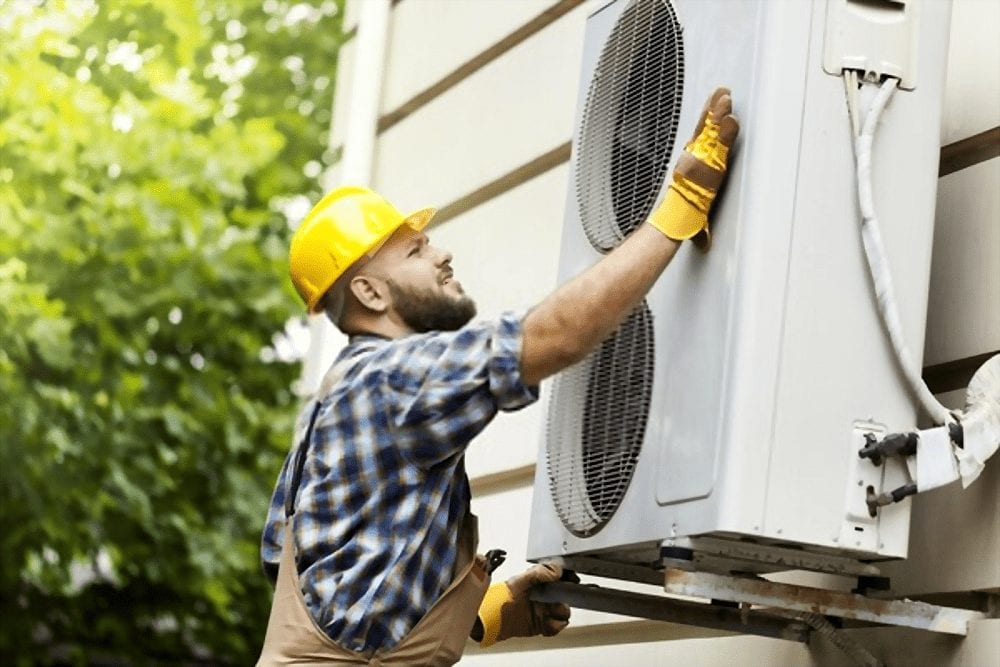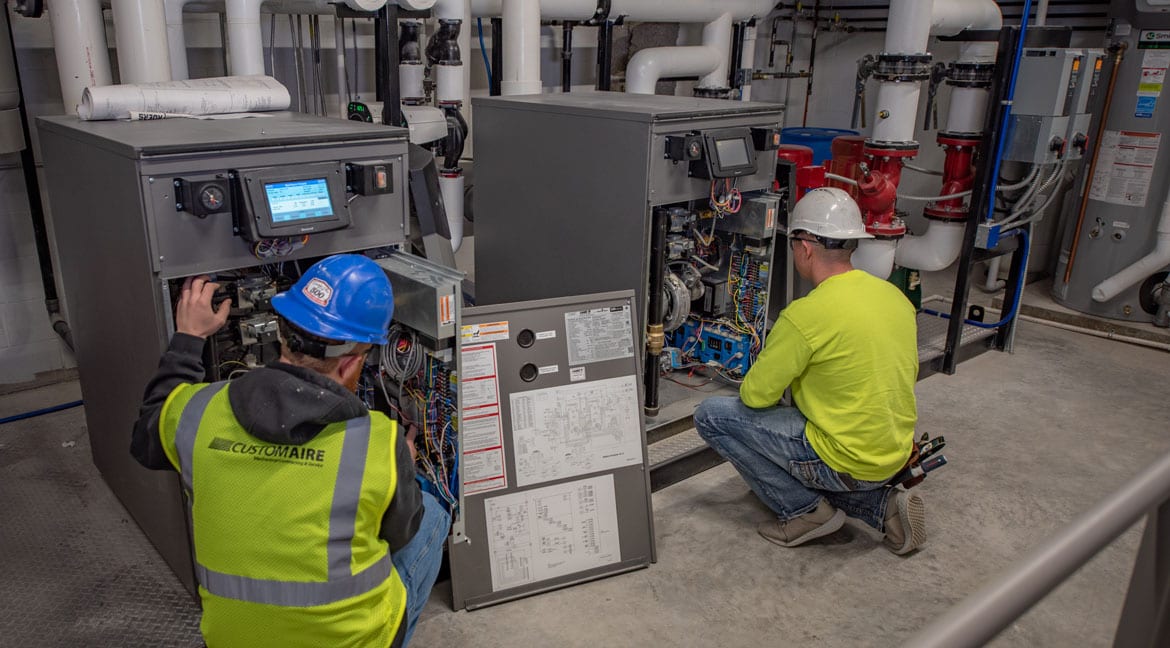Why Property Owners are Switching to ductless mini splits for Modern HVAC Needs
Why Property Owners are Switching to ductless mini splits for Modern HVAC Needs
Blog Article
Choosing In Between a Warmth Pump and Heater: Secret Factors To Consider for Your A/c Demands
When evaluating home heating options for cooling and heating needs, the decision in between a heat pump and a heating system can be complex. Each system offers distinct benefits customized to details climates and power performance goals. Comprehending these differences is necessary for making an informed option. Secret aspects such as setup prices and environmental influence additionally complicate the option procedure. Which option genuinely lines up with one's convenience and sustainability choices? The complying with areas will discover these considerations carefully.
Recognizing Heat Pumps: Just How They Function and Their Benefits
While several homeowners think about numerous heating options, understanding how heatpump function and their benefits can greatly influence their decision. Heatpump run by transferring warm as opposed to creating it. In the winter season, they extract warmth from the outdoors air or ground and move it inside your home, while in the summer season, they reverse this process, cooling down the home by getting rid of warmth outside. This double functionality makes them flexible for year-round environment control.One of the key benefits of warmth pumps is their power effectiveness. They make use of considerably less electrical power contrasted to typical home heating systems, possibly leading to lower energy bills (heat pump replacement ooltewah tn). Furthermore, warm pumps have a smaller sized carbon footprint, making them an eco-friendly option. They also need much less maintenance than conventional systems, adding to long-term cost financial savings. Generally, recognizing the technicians and benefits of warmth pumps can assist house owners make notified choices concerning their home heating and cooling requirements
Discovering Heating Systems: Kinds, Procedure, and Benefits
Heaters are available in different kinds, including gas, electrical, and oil models, each with distinctive functional mechanisms. Comprehending these differences is essential, as they impact effectiveness and home heating performance. Furthermore, heaters offer many benefits, such as regular heat output and integrity in chillier environments.
Kinds of Heating systems
Heater can vary considerably in design and operation, with furnaces being a prominent choice amongst homeowners. There are several sorts of heating systems, each making use of different fuel sources and modern technologies. Gas furnaces prevail, leveraging all-natural gas to create warm effectively. Electric heaters, on the other hand, make use of electric resistance to create warmth, commonly preferred for their simple setup. Oil furnaces, while much less common, are efficient in areas with restricted gas accessibility (heat pump service). Furthermore, condensing heating systems optimize power efficiency by reusing and capturing exhaust gases. Each kind runs through a system of heat exchangers and ductwork to distribute cozy air throughout a home. Comprehending the differences between these heating system types is important for educated HVAC choices
Benefits of Heaters
For property owners seeking reputable warmth during cool months, the benefits of heating systems are significant. Heaters provide consistent home heating, making certain also temperature levels throughout the home. They are particularly efficient in extreme cool, often surpassing heatpump in icy problems. Different kinds, including gas, electric, and oil heaters, supply adaptability to meet diverse requirements and preferences.Furnaces likewise tend to have reduced initial installment costs contrasted to heat pumps, making them a more accessible choice for many. Their durable design adds to a much longer lifespan, with several devices lasting over 15 years with correct maintenance. In addition, modern-day heating systems are commonly outfitted with innovative technology for enhanced efficiency, which can bring about reduced power costs. In general, heaters continue to be a reliable option for reliable home heating.

Energy Effectiveness: Comparing Warmth Pumps and Furnaces
When contrasting power efficiency between heatpump and heaters, the Seasonal Power Efficiency Proportion (SEER) plays an important role in establishing performance. In addition, a functional cost analysis exposes the lasting economic effects of each system. Understanding these variables can guide property owners in making notified decisions concerning their home heating solutions.
Seasonal Energy Performance Proportion
Energy effectiveness plays a necessary role in the decision-making procedure in between warmth pumps and heating systems, especially when considering the Seasonal Power Efficiency Proportion (SEER) This metric steps the cooling effectiveness of heatpump over a whole air conditioning season, providing a standardized way to evaluate performance. Higher SEER rankings indicate higher energy performance, translating to reduced power consumption and lowered utility bills. On the other hand, furnaces are commonly examined utilizing the Yearly Gas Usage Effectiveness (AFUE) score, which mirrors heating efficiency. When comparing these 2 systems, homeowners must focus on SEER scores for warmth pumps, as they directly impact general energy cost savings and ecological sustainability. A comprehensive understanding of click now SEER can especially affect the lasting complete satisfaction and cost-effectiveness of the selected HVAC service.
Operational Price Analysis
Recognizing the operational expenses connected with warmth pumps and heaters is essential for property owners examining their choices. Heat pumps commonly use higher energy effectiveness, converting electrical energy into warm with minimal waste. This causes reduced month-to-month utility expenses, particularly in moderate environments. Conversely, conventional furnaces, specifically gas designs, might have reduced ahead of time expenses however can sustain greater operational expenses over time as a result of fuel rates and efficiency ratings.Moreover, heatpump can see here now function as both heating and cooling down systems, potentially minimizing the demand for separate HVAC systems. While initial investments for warm pumps may be higher, their long-lasting cost savings in power efficiency can make them an extra economical selection for several homes. Careful evaluation of local energy rates is vital to determine the finest option.
Setup Prices: What to Expect for Each Furnace
Setup costs for furnace can differ substantially between heatpump and heating systems, influencing home owners' choices. Warm pumps typically have higher ahead of time setup costs, commonly ranging from $3,500 to $8,000, depending upon the system dimension and complexity of installment. This includes the exterior unit, interior handling system, and essential ductwork modifications. Conversely, heaters often tend to have reduced first expenses, balancing in between $2,500 and $6,000, which can be appealing for budget-conscious homeowners. Setup expenses can raise if extensive ductwork is required.Moreover, the option of gas type for heaters-- all-natural gas, propane, or electrical-- can additionally influence setup costs. While warmth pumps provide power performance, their first financial investment may discourage some customers. Inevitably, reviewing setup prices alongside long-lasting cost savings and performance will certainly help house owners in making informed choices regarding their furnace.
Environment Considerations: Which System Executes Better in Your Location
Just how do climate conditions affect the performance of furnace? The performance of heatpump and heaters can differ greatly depending on the local climate. In modest climates, warmth pumps excel by effectively transferring heat from the outside air, making them an energy-saving alternative. Their effectiveness lessens in exceptionally cold temperature levels, where they may struggle to draw out sufficient heat. Alternatively, heating systems, specifically gas designs, supply dependable and consistent warmth despite outside conditions, making them preferable in colder regions.In areas that experience milder winters, heatpump can run properly year-round, giving both cooling and heating. On the other hand, areas with extreme winters typically profit from the effectiveness of heaters. Inevitably, understanding the regional environment is important when determining in between a heatpump and a furnace, as it straight affects their functional efficiency and general performance.
Maintenance Demands: Long-Term Take Care Of Warm Pumps vs. Furnaces
While both heat pumps and heating systems need normal upkeep to ensure peak performance, their particular requirements and treatment routines vary considerably. Heating systems usually require less constant focus, with yearly examinations being adequate to examine for this content gas leaks, tidy filters, and examine total performance. Their less complex style typically permits uncomplicated repairs.In contrast, warm pumps demand semiannual upkeep as a result of their twin duty in cooling and heating. This includes cleansing coils, examining refrigerant levels, and ensuring that both the indoor and exterior systems operate at their best. Furthermore, heatpump maintenance typically involves more elaborate parts, making expert maintenance essential.Neglecting maintenance can result in diminished performance and raised energy expenses for both systems. Inevitably, home owners must take into consideration these lasting care needs when picking between a heatpump and a furnace, as positive upkeep can expand the life-span and performance of either system significantly.
Environmental Impact: Picking a Lasting Heating Choice
The environmental impact of heater is a critical examination for homeowners looking for sustainable alternatives. Warm pumps are normally a lot more energy-efficient than conventional heaters, as they transfer heat as opposed to create it, substantially lowering carbon discharges. By utilizing renewable resource resources, such as geothermal or air-source warm pumps, house owners can further reduce their ecological footprint.On the other hand, all-natural gas heaters release greenhouse gases and add to air contamination, though they commonly provide higher warmth outcome. Advancements in technology have led to the advancement of high-efficiency heating systems that reduce emissions.Ultimately, picking a heating system involves considering performance versus ecological impact. House owners are motivated to assess neighborhood power resources and incentives for renewable systems, ensuring a choice that lines up with both personal comfort and ecological obligation. The choice influences not only prompt convenience yet additionally long-term sustainability and ecological health and wellness.
Regularly Asked Questions
How Much Time Do Warm Pumps and Furnaces Normally Last?
The lifespan of heat pumps typically ranges from 15 to 20 years, while heaters can last in between 15 to three decades. Routine upkeep considerably influences their long life and performance in offering heating remedies.
Can I Make Use Of a Heat Pump in Extremely Cold Climates?
Heatpump can operate in very cool climates, but their performance reduces as temperature levels decline. In such problems, supplementary heating sources might be needed to preserve comfortable interior temperature levels and guarantee peak performance.

What Is the Noise Level of Heat Pumps Versus Furnaces?
The sound degrees of warmth pumps and furnaces vary substantially. Typically, heatpump run even more silently than traditional heaters, making them more suitable for those conscious seem, while furnaces may produce louder functional noises throughout heating cycles.
Are Warm Pumps Suitable for Both Home Heating and Cooling?
Warm pumps are without a doubt appropriate for both heating & cooling (furnace replacement). They operate by transferring heat, supplying efficient temperature level control year-round, making them a flexible option for house owners looking for an all-in-one a/c solution
What Dimension Home Heating System Do I Required for My Home?
Determining the suitable dimension home heating system for a home calls for assessing factors such as square footage, insulation high quality, neighborhood climate, and the home's format. Consulting an expert can ensure a precise analysis and ideal comfort. Warmth pumps typically offer higher energy effectiveness, transforming electric power into heat with marginal waste. In modest climates, warmth pumps succeed by successfully transferring warm from the outside air, making them an energy-saving alternative. Alternatively, heating systems, specifically gas versions, provide trustworthy and regular warm regardless of outdoor problems, making them better in chillier regions.In areas that experience milder winter seasons, warm pumps can operate properly year-round, providing both heating and air conditioning. Warm pumps are generally extra energy-efficient than traditional furnaces, as they transfer warm instead than generate it, greatly decreasing carbon emissions. By making use of eco-friendly energy sources, such as geothermal or air-source heat pumps, house owners can further decrease their ecological footprint.On the various other hand, natural gas furnaces emit greenhouse gases and contribute to air pollution, though they frequently give higher heat output.
Report this page